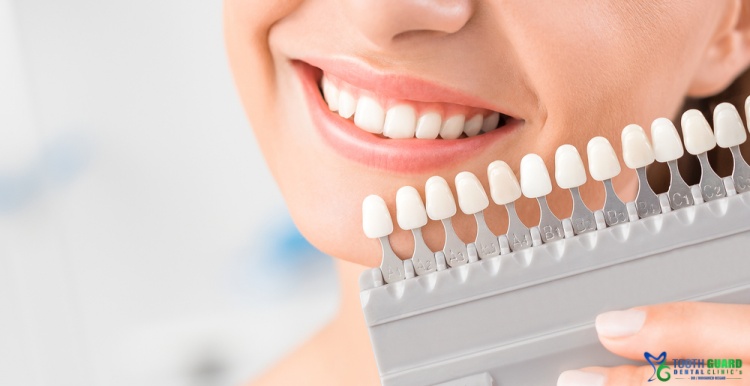
Teething is a natural process that usually begins between the ages of 6 and 12 months. With the appearance of teeth, the child is able to expand his diet to include a variety of foods instead of relying only on pureed foods. However, the teething process is stressful for both the child and the mother, as it is accompanied by a group of disturbing symptoms. Which may disturb the child and affect his comfort.
The problem with symptoms of teething in infants is that they may be similar to some signs of infection, so it is important to know the symptoms of teething and the difference between them and other symptoms that may indicate a medical condition.
Dr. Mohamed Hegab is considered one of the best dentists in Egypt. He has the largest Tooth Guard dental clinics, where he provides his patients with first-class dental care that changes your smile. He also has an experienced team present to provide exceptional service whether you are here for a routine examination or cosmetic dentistry. Advanced.
Through this article, we will learn together about the symptoms of early teething in infants, and what are the reasons that lead to delayed teething in infants?
Most teething in infants begins between the ages of 6 and 12 months. However, this process may vary from one child to another. In some cases, the child may not have any teeth until he reaches the age of one year. Often the first tooth appears at the age of 6 months, where the front teeth (lower incisors) begin. ) appear first, then others follow, and most children usually have their teeth completed by the age of 3 years.
symptoms of teething in infants begin with the appearance of primary (baby) teeth first, and then they are replaced one by one, starting at the age of 6 years, by permanent teeth.
By age 3, a child often has a complete set of 20 baby teeth.
Baby teeth have thinner enamel compared to permanent teeth, making them appear whiter and almost translucent.
Baby teeth are more susceptible to decay and damage.
When permanent teeth first appear, they have wavy edges, and their shape gradually begins to become regular over time.
In general, if teething symptoms appear, they usually begin about four days before the tooth appears and continue for up to three days afterward.
Teething is a natural process that usually begins between the ages of 6 and 12 months. With the appearance of teeth, the baby is able to eat a wider variety of foods, rather than being limited to pureed foods only.
However, the teething process is stressful for both the baby and the mother as it is often accompanied by a host of disturbing symptoms.
The problem with symptoms of teething in infants is that they may be similar to some signs of infection, so it is important to know the symptoms of teething and the difference between them and other symptoms that may indicate a medical condition.
Teething symptoms in babies include:
Drooling: Teething begins in infants in the fourth month and helps soothe the gums.
rash: It appears around the mouth and chin due to excess saliva.
Bite: The child bites his toys and fingers to relieve gum pain.
Crying and irritability: As a result of inflammation of the delicate gum tissue.
Refusal to breastfeed and eat: Expressing milk increases pain.
Frequent waking up at night: Because the child feels uncomfortable.
Ear pulling and cheek rubbing: It is associated with pain in the common nerves.
Hematoma in the gums: It appears as a bluish swelling, and requires consulting a doctor if it increases in size.
Symptoms vary: It may appear in varying degrees or not in some children.
Teething is the process of the appearance of baby teeth during the age period between 3 and 12 months. Usually, the first teeth begin to appear between the ages of 6 and 9 months in the form of two pairs. The full 20 baby teeth may take several years to complete.
The most important symptoms of teething in infants are the following:
The child becomes moody and cries a lot.
He has difficulty sleeping.
Doesn't want to eat.
His mouth is drooling more than usual.
The baby's temperature rises very slightly during teething, but if the temperature reaches 38 degrees Celsius or more, you should consult a doctor immediately.
If the child has a high temperature, Or vomiting، Or diarrhea During teething, you should consult a doctor to confirm whether he has another medical condition that requires treatment.
Symptoms of teething teeth are a normal part of dental development in children, however the extent to which these symptoms last varies from one child to another.
When a baby starts teething, he may experience gum pain and extreme discomfort, making him more irritable and moody.
Other symptoms include difficulty sleeping, loss of appetite, excessive saliva secretion, and constant licking and chewing of things. In addition, swelling and redness may appear in the gums surrounding the tooth.
Symptoms of teething teeth usually last for a period ranging from 3 to 5 days, after which the child begins to feel relief and his pain subsides. However, the child must be followed up and the necessary comfort and care provided during this period so that he can easily deal with the problem. symptoms of teething in infants Alleviating the pain and discomfort caused by it.
When babies are born, most of their teeth are under the gums. The first tooth usually begins to appear before the age of six months, although the exact age of teething can vary from one child to another. The first two teeth usually begin to appear in the bottom middle, followed by the four in the upper middle. Symptoms of teething in infants include drooling and irritability. Biting and biting are common signs at this stage. Most children have a full set of 20 baby teeth by the age of three.
Some children may be late in getting their teeth compared to their peers. This is due to several factors. If the child does not have any teeth by the age of 18 months, it is necessary to consult a pediatric dentist to evaluate his condition.
The reasons for delayed teething include:
In some cases, delayed teething may be a genetic trait that runs in the family, as it can be inherited from a parent. If you or someone in your family got their first tooth late, the same thing will likely happen to your child if you were late in teething before. Without accompanying medical problems, you often don't have to worry about your baby.
In other cases, delays in teething may be a symptom of other health problems. Children who were born prematurely or had low birth weight may suffer from delayed teething.
They may also have defects in... Enamel.
Some genetic conditions can cause teeth to appear late and be poorly formed.
Delayed tooth eruption may also be a symptom of malnutrition or a deficiency of some vitamins and minerals, especially calcium and vitamin D.
Delayed teething may also be related to Down syndrome or hypothyroidism. Hypothyroidism causes other symptoms such as weakness, fatigue, headaches, and joint stiffness.
The child may also experience delays in walking and speaking, as well as weight gain in some cases.
Read about Orthodontic price
Delayed teething in infants may cause concern for mothers, but it often does not indicate a serious problem. There are some procedures that can be followed to stimulate tooth growth and support the child’s health.
Methods of treating delayed teething in infants:
Provide foods rich in calcium and vitamin D.
Expose the child to sunlight daily.
Consult a doctor to give nutritional supplements if necessary.
Examine the child to ensure that there are no health problems.
Gently massage your gums or use teething toys.
Follow up the child's general development with the pediatrician.
Be patient, as delay may be normal in some cases.
When symptoms of teething in infants appear, it is best to consult a doctor or pharmacist before giving medications to children, especially infants, as they usually recommend these medications. They are best for relieving teething pain:
Paracetamol is a medicine used to relieve teething pain and is considered safe to use for babies from 3 months of age. Among its trade names:
Paramol.
Panadol.
Neomol.
ريفانين (Revanin).
Ibuprofen is an effective medication for relieving teething pain, and is considered safe for use in children starting at 6 months of age. Among its trade names:
Ambafen.
Nurofen
Prof. Prof.
Balkaprofen.
It is necessary to consult a specialist doctor before using any of these medications to ensure the safety of your child, as using medications without medical guidance may expose the child to unexpected health risks.
In conclusion, symptoms of teething in infants appear naturally and differ from one child to another. Common symptoms may include such as drooling, difficulty sleeping, and food refusal, in addition to swollen gums. When mothers notice abnormal symptoms, they must consult a doctor to ensure the child’s comfort and safety.
You can contact us at the center tooth guard To Dr. Muhammad Hijab through the website or phone numbers 201555004694
Learn more about Dental cantilever bridge
اكتشف أحدث النصائح والمعلومات حول صحة الأسنان من خلال مدونتنا






Our team is ready to help with dates, answer your questions and guide you towards achieving your perfect smile